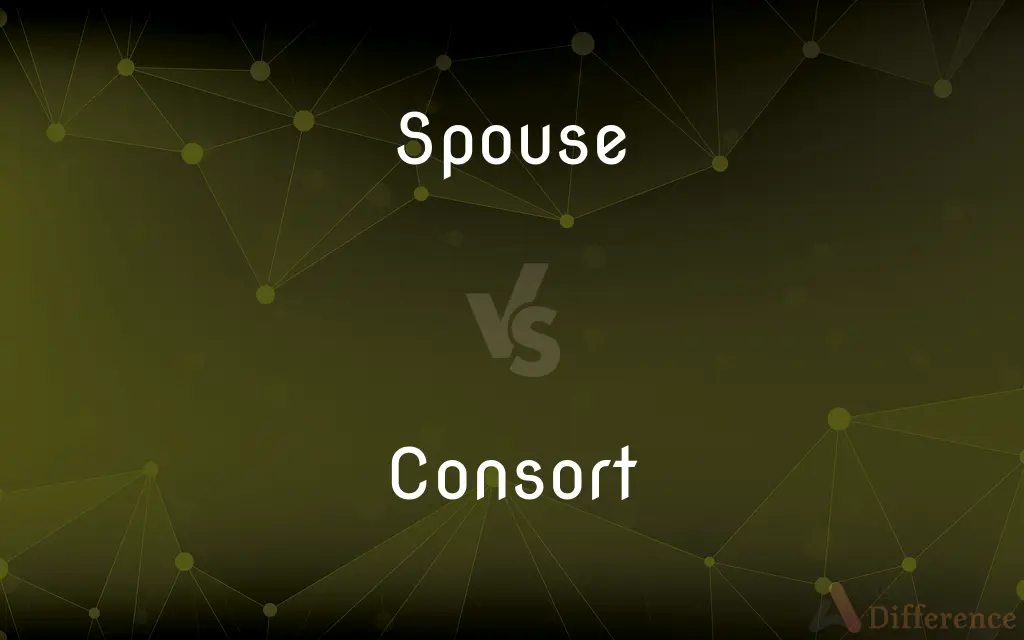Spouse vs. Consort — What's the Difference?
By Urooj Arif & Maham Liaqat — Updated on April 18, 2024
A spouse is a legally married partner, typically in a monogamous relationship, while a consort is often associated with royalty, implying a spouse of a reigning monarch.

Difference Between Spouse and Consort
Table of Contents
ADVERTISEMENT
Key Differences
A spouse refers to a partner in a legally recognized marriage, which can encompass emotional, social, and legal commitments. On the other hand, a consort specifically denotes the spouse of a reigning monarch, emphasizing a role within a royal family rather than a legal status.
Spouses typically share rights and responsibilities defined by law, including financial obligations, inheritance rights, and decision-making in familial matters. Whereas consorts may also share some of these rights, their position often includes ceremonial duties and the responsibility to uphold royal traditions.
In most societies, the term spouse is applicable to both partners in a marriage, regardless of gender or royal status. In contrast, consort is used almost exclusively in the context of royalty, and may not imply the same legal marital status as spouse.
While the role of a spouse is generally consistent across different cultures and legal systems, focusing on partnership and mutual support, the role of a consort can vary significantly based on the customs and expectations of a royal institution.
The concept of a spouse is understood globally and is a fundamental aspect of family law. On the other hand, the term consort may not be as widely recognized outside of contexts that deal with monarchy or historical forms of governance.
ADVERTISEMENT
Comparison Chart
Definition
A legally married partner.
A spouse of a reigning monarch, usually in royalty.
Legal status
Recognized in all jurisdictions that allow marriage.
May vary; not always recognized as legal spouse.
Duties
Shared domestic and legal responsibilities.
Often includes ceremonial and official duties.
Applicability
Universal in cultures recognizing marriage.
Specific to monarchies and certain cultures.
Gender neutrality
Gender-neutral term.
Historically gendered, but modern usage varies.
Compare with Definitions
Spouse
A person's partner in marriage.
She introduced me to her spouse at the company picnic.
Consort
A companion or partner of a monarch.
The historical drama focuses on the king’s consort.
Spouse
Legally wedded individual.
His spouse was called as a witness in the trial.
Consort
The spouse of a reigning king or queen.
The queen consort participated in the state ceremony.
Spouse
Partner in a conjugal relationship.
Each spouse must sign the consent form.
Consort
Someone associated with royalty by marriage.
The new consort is learning royal protocols.
Spouse
One half of a married couple.
Her spouse also works in the education sector.
Consort
A term used to denote the non-reigning spouse in a monarchy.
The prince consort attended the summit on behalf of the queen.
Spouse
The significant other in a marital union.
His spouse accompanied him to the award ceremony.
Consort
A title for the spouse of a sovereign.
The consort’s role is often defined by tradition and ceremony.
Spouse
A spouse is a significant other in a marriage, civil union, or common-law marriage. The term is gender neutral, whereas a male spouse is a husband and a female spouse is a wife.
Consort
A wife, husband, or companion, in particular the spouse of a reigning monarch
Queen Victoria and her consort, Prince Albert
Spouse
A husband or wife, considered in relation to their partner.
Consort
A ship sailing in company with another.
Spouse
A marriage partner; a husband or wife.
Consort
A small group of musicians performing together, typically playing instrumental music of the Renaissance period
An anthology of Tudor consort music
A consort of viols
Spouse
To marry; wed.
Consort
Habitually associate with (someone), typically with the disapproval of others
You chose to consort with the enemy
Spouse
A person in a marriage or marital relationship.
People should treat their spouses with respect.
Consort
A husband or wife, especially the spouse of a monarch.
Spouse
(dated) To wed; to espouse.
Consort
A companion or partner.
Spouse
A man or woman engaged or joined in wedlock; a married person, husband or wife.
At last such grace I found, and means I wrought,That I that lady to my spouse had won.
Consort
A ship accompanying another in travel.
Spouse
A married man, in distinction from a spousess or married woman; a bridegroom or husband.
At which marriage was [were] no persons present but the spouse, the spousess, the Duchess of Bedford her mother, the priest, two gentlewomen, and a young man.
Consort
Partnership; association
Governed in consort with her advisers.
Spouse
To wed; to espouse.
This markis hath her spoused with a ring.
Though spoused, yet wanting wedlock's solemnize.
She was found again, and spoused to Marinell.
Consort
A group; a company
A consort of fellow diplomats.
Spouse
A person's partner in marriage
Consort
An instrumental ensemble.
Consort
An ensemble using instruments of the same family.
Consort
To keep company; associate
A politician known to consort with gangsters.
Consort
To be in accord or agreement.
Consort
To unite in company; associate.
Consort
To escort; accompany.
Consort
To espouse.
Consort
The spouse of a monarch.
The consort of the queen has passed from this troubled sphere.
Consort
A husband, wife, companion or partner.
Consort
A ship accompanying another.
Consort
(uncountable) Association or partnership.
Consort
A group or company, especially of musicians playing the same type of instrument.
Consort
(obsolete) Harmony of sounds; concert, as of musical instruments.
Consort
(postpositive) of a title, by virtue of one's (living) spouse; often contrasted with regnant and dowager
Queen Elizabeth The Queen Mother took on nearly as many duties as queen dowager, after her husband's death, as she had had when she was queen consort during his reign.
Consort
(intransitive) To associate or keep company (with).
Consort
(intransitive) To be in agreement.
Consort
One who shares the lot of another; a companion; a partner; especially, a wife or husband.
He single chose to live, and shunned to wed,Well pleased to want a consort of his bed.
The consort of the queen has passed from this troubled sphere.
The snow-white gander, invariably accompanied by his darker consort.
Consort
A ship keeping company with another.
Consort
Concurrence; conjunction; combination; association; union.
Take it singly, and it carries an air of levity; but, in consort with the rest, has a meaning quite different.
Consort
An assembly or association of persons; a company; a group; a combination.
In one consort' there satCruel revenge and rancorous despite,Disloyal treason, and heart-burning hate.
Lord, place me in thy consort.
Consort
Harmony of sounds; concert, as of musical instruments.
To make a sad consort';Come, let us join our mournful song with theirs.
Consort
To unite or to keep company; to associate; - used with with.
Which of the Grecian chiefs consorts with thee?
Consort
To unite or join, as in affection, harmony, company, marriage, etc.; to associate.
He with his consorted Eve.
For all that pleasing is to living earsWas there consorted in one harmony.
He begins to consort himself with men.
Consort
To attend; to accompany.
Thou, wretched boy, that didst consort him here,Shalt with him hence.
Consort
The husband or wife of a reigning monarch
Consort
A family of similar musical instrument playing together
Consort
Keep company with; hang out with;
He associates with strange people
She affiliates with her colleagues
Consort
Go together;
The colors don't harmonize
Their ideas concorded
Consort
Keep company;
The heifers run with the bulls ot produce offspring
Common Curiosities
Can a consort be a spouse?
Yes, a consort is often a spouse, but the term is specifically used in the context of royalty.
How does the role of a consort differ in different countries?
The role can vary significantly, especially depending on whether the monarchy is ceremonial or holds governing power.
What is the main difference between a spouse and a consort?
A spouse is a legally married partner in a civil context, whereas a consort is typically the married partner of a monarch.
Is the term spouse gender-specific?
No, the term spouse is gender-neutral and applicable to either partner in a marriage.
Can a consort inherit the throne?
Generally, consorts do not inherit the throne; inheritance follows the royal lineage.
Can the terms spouse and consort be used interchangeably?
They are not typically interchangeable due to the specific royal association with consort.
What happens to a consort if the monarch dies?
They may retain their title or receive a new title, depending on the monarchy’s traditions.
Is consort used in modern monarchies?
Yes, many contemporary monarchies still use the term consort to describe the monarch's spouse.
Are the rights of a spouse and a consort the same?
No, while they may overlap, a consort's rights can include unique royal privileges and duties that are different from those of a general spouse.
How are consorts chosen?
Consorts are chosen through marriage to a monarch, which can be influenced by personal choice, political alliances, or both.
Does the term spouse have any royal connotations?
No, spouse is a general term used across various societal levels and does not imply royal status.
How do cultural perceptions of spouses and consorts differ?
Spouses are universally recognized, while consorts are primarily relevant in cultural contexts with monarchies.
What is the significance of a consort in state functions?
A consort often plays a ceremonial role, participating in state functions and representing the monarchy.
What legal recognition does a consort have?
This depends on the country’s laws regarding monarchy and royal family status; it can vary widely.
Can a person be a consort without being married to the monarch?
Typically, consort implies a marital relationship, although historical exceptions exist.
Share Your Discovery

Previous Comparison
Contract vs. Reduce
Next Comparison
Ton vs. TonnageAuthor Spotlight
Written by
Urooj ArifUrooj is a skilled content writer at Ask Difference, known for her exceptional ability to simplify complex topics into engaging and informative content. With a passion for research and a flair for clear, concise writing, she consistently delivers articles that resonate with our diverse audience.
Co-written by
Maham Liaqat











































